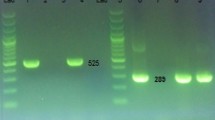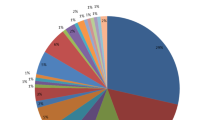Abstract
IN the summer of 1964, cases of leptospirosis developed in man as a result of swimming in a farm creek. During epidemiological studies, six leopard frogs (Rana pipiens) were collected from these waters. Blood samples were obtained from the frogs. Two pools of kidneys (A and B) were made from three frogs each. Leptospires were not observed on dark-field microscopy of the kidney suspensions. These were diluted with Stuart's liquid media (1 : 10–1: 100,000) and 2–3 drops from the dilutions inoculated1 into semi-solid media: bovine-albumin ‘Tween 80’ (ref. 2) containing 5-fluorouracil3 (96 µg/ml.) (Hoffman-LaRoche, Inc., Nutley, New Jersey) and Fletcher's semi-solid media1. The inoculated media were incubated at 28°–30° C for 90 days and examined periodically by dark-field microscopy. Leptospires were isolated from pool B in albumin ‘Tween 80’ medium on the twentieth day after inoculation. Observations of the frog isolate by electron microscopy indicated that the organisms were morphologically characteristic of the genus Leptospira4.
This is a preview of subscription content, access via your institution
Access options
Subscribe to this journal
Receive 51 print issues and online access
$199.00 per year
only $3.90 per issue
Buy this article
- Purchase on Springer Link
- Instant access to full article PDF
Prices may be subject to local taxes which are calculated during checkout
Similar content being viewed by others
References
Galton, M. M., Menges, R. W., Shotts, jun., E. B., Nahmias, A. J., and Heath, C. W., Public Health Service Publication No. 951, 1962 (U.S. Department of Health, Education and Welfare).
Ellinghausen, jun., H. C., and McCullough, W. G., Amer. J. Vet. Res., 26, 45 (1965).
Johnson, R. C., and Rogers, P., J. Bact., 87, 422 (1964).
Ritchie, A. E., and Ellinghausen, jun., H. C., J. Bact., 89, 223 (1965).
Ellinghausen, jun., H. C., and McCullough, W. G., Amer. J. Vet. Res., 26, 39 (1965).
Van Thiel, P. H., Antonie Van Leeuwenhoek. J. Microbiol. Serol., 14. 129 (1948).
Babudieri, B., Ann. N.Y. Acad. Sci., 70, 393 (1958).
Combiesco, D., Sturdza, N., Radu, I., Sefer, M., and Nicolesco, I., Arch. Roumaines Path. Exp. et Microbiol., 18, 361 (1959). (Abstr. in Bull, Hyg.), 35, 1006 (1960).
Van der Hoeden, J., Szenberg, J. E., and Evenchik, Z., Nature, 190, 95 (1961).
Abdulla, P. K., and Karstad, L., Zoonoses Res., 1, 295 (1962).
White, F. H., Amer. J. Vet. Res., 24, 179 (1963).
Ferris, D. H., Rhoades, H. E., Hanson, L. E., Galton, M. M., and Mansfield, M. E., Cornell Vet., 51, 405 (1961).
Plesko, I., Janovicova, E., and Lac, J., Zbl. Bakt. I., 192, 482 (1964). (Abstr. in Vet. Bull., 34, 580 (1964).)
Author information
Authors and Affiliations
Rights and permissions
About this article
Cite this article
DIESCH, S., MCCULLOCH, W., BRAUN, J. et al. Leptospires isolated from Frog Kidneys. Nature 209, 939–940 (1966). https://doi.org/10.1038/209939a0
Issue Date:
DOI: https://doi.org/10.1038/209939a0
This article is cited by
-
Meta-analysis to estimate the load of Leptospira excreted in urine: beyond rats as important sources of transmission in low-income rural communities
BMC Research Notes (2017)
-
Prevalence of antibodies against Leptospira sp. in snakes, lizards and turtles in Slovenia
Acta Veterinaria Scandinavica (2013)
-
The Absence of Zoonotic Agents in Invasive Bullfrogs (Lithobates catesbeianus) in Belgium and The Netherlands
EcoHealth (2013)
-
Systematics of a leptospira strain isolated from frog
Experientia (1972)
Comments
By submitting a comment you agree to abide by our Terms and Community Guidelines. If you find something abusive or that does not comply with our terms or guidelines please flag it as inappropriate.



